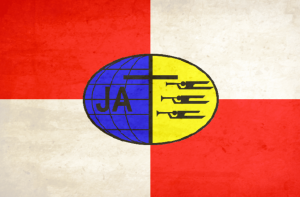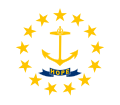Difference between revisions of "AY Honors/Christian Citizenship/Answer Key/es"
(Created page with "</noinclude> <!-- 4. Explicar el significado y el motivo del Himno Nacional, y recitar la letra de memoria. --> El Himno Nacional de los Estados Unidos de América es «The St...") |
(Created page with ";The Star Spangled Banner: :''O say, can you see, by the dawn’s early light,'' :''What so proudly we hailed at the twilight’s last gleaming,'' :''Whose broad stripes and b...") |
||
| Line 133: | Line 133: | ||
:''O say, does that star-spangled banner yet wave'' | :''O say, does that star-spangled banner yet wave'' | ||
:''O’er the land of the free and the home of the brave?'' | :''O’er the land of the free and the home of the brave?'' | ||
| + | |||
| + | ;Adaptación del himno en castellano adoptada por los inmigrantes latinoamericanos en Estados Unidos. Se estrenó en las protestas de inmigrantes en los Estados Unidos en 2006. | ||
| + | |||
| + | :''Amanece: ¿lo veis a la luz de la aurora'' | ||
| + | :''Lo que tanto aclamamos la noche al caer?'' | ||
| + | :''Sus estrellas, sus franjas, flotaban ayer,'' | ||
| + | :''En el fiero combate en señal de victoria.'' | ||
| + | :''Fulgor de lucha, al paso de la libertad,'' | ||
| + | :''Por la noche decían: «¡Se va defendiendo!»'' | ||
| + | :''¡Oh, decid! ¿Despliega aún su hermosura estrellada'' | ||
| + | :''Sobre tierra de libres la bandera sagrada?'' | ||
<noinclude></noinclude> | <noinclude></noinclude> | ||
Revision as of 18:46, 2 March 2021
1
Banderas estatales
2
- a. Campamento
- b. Feria
- c. Programa del Día del Conquistador
- d. Desfile
Cuando marchando en un desfile, sólo hay una bandera que tiene pautas en cuanto a su ubicación. Esa bandera es la bandera de los EE. UU.
Al marchar con una sola fila de banderas, la bandera de los EE. UU. siempre está en el extremo derecho de la fila (como se ve desde la columna que sigue detrás de las banderas).
Cuando marchando con múltiples hileras de banderas, la bandera de los EE. UU. siempre está en la primera fila. La bandera de los EE. UU. también está sola en la primera fila. La bandera de los EE. UU. estará en la primera fila, al frente de la columna desde la posición central de la fila.
La bandera de los EE. UU. nunca debe ser inclinada en señal de respeto a un dignatario. Las banderas de los Conquistadores, JA, cristiana y estatales se inclinan cuando se da el mando de «vista a la derecha», pero la bandera de los EE. UU. debe mantenerse en posición recta.
3
Doblar
Adventist Youth Honors Answer Book/Flag folding/es
Note que la bandera se dobla de manera diferente cuando se prepara para izarla.
Protocolo de la bandera
Adventist Youth Honors Answer Book/Flag protocol/es
- Saludar la bandera
- Los civiles deben colocar la mano derecha sobre el corazón, excepto cuando usan ropa atlética, en cuyo caso deben quitarse el sombrero y estar en posición firme. Un saludo de mano no es necesario. Los hombres civiles que llevan los sombreros deben quitarse el sombrero y ponerlo en su hombro izquierdo, con la mano sobre el corazón. Los extranjeros deben simplemente quedar en posición firme. Por supuesto, los uniformados (incluyendo el uniforme de gala de Conquistadores) deben rendir el saludo militar. Cuando la bandera está en movimiento, como en un desfile, es correcto saludarla cuando esté a seis pasos delante de usted y mantenga el saludo hasta que pase seis pasos más.
La bandera nacional cuando en un poste siempre debe estar colocada a la derecha del orador (a la izquierda según se ve por la audiencia). Esto se puede verificar mediante la observación de los discursos del presidente de los Estados Unidos. La bandera está siempre a su derecha.
4
El Himno Nacional de los Estados Unidos de América es «The Star-Spangled Banner» (La bandera tachonada de estrellas). La letra fue escrita el 14 de septiembre de 1814, a bordo de una fragata británica en el puerto de Baltimore, donde el autor, Francis Scott Key (1779-1843) había sido detenido después de peticionar con éxito para la liberación de un amigo civil. Él se inspiró para escribir el poema cuando vio por la mañana la bandera de los Estados Unidos ondeando sobre el fuerte McHenry, que había resistido el bombardeo británico durante la noche anterior. Dispone de 4 estrofas y todos terminan en «O'er the land of the free and the home of the brave! (Sobre la tierra de los libres y el hogar de los valientes)», lo que significa que los Estados Unidos fue construida sobre los aspectos de la libertad y la independencia.
- The Star Spangled Banner
- O say, can you see, by the dawn’s early light,
- What so proudly we hailed at the twilight’s last gleaming,
- Whose broad stripes and bright stars, through the perilous fight,
- O’er the ramparts we watched, were so gallantly streaming?
- And the rockets’ red glare, the bombs bursting in air,
- Gave proof through the night that our flag was still there;
- O say, does that star-spangled banner yet wave
- O’er the land of the free and the home of the brave?
- Adaptación del himno en castellano adoptada por los inmigrantes latinoamericanos en Estados Unidos. Se estrenó en las protestas de inmigrantes en los Estados Unidos en 2006.
- Amanece: ¿lo veis a la luz de la aurora
- Lo que tanto aclamamos la noche al caer?
- Sus estrellas, sus franjas, flotaban ayer,
- En el fiero combate en señal de victoria.
- Fulgor de lucha, al paso de la libertad,
- Por la noche decían: «¡Se va defendiendo!»
- ¡Oh, decid! ¿Despliega aún su hermosura estrellada
- Sobre tierra de libres la bandera sagrada?
5
Rights
United States' citizens have the right to fully participate in the political system of the United States (with most member states having restrictions for felons, and a federal restriction on naturalized persons running for President and Vice President of the United States), are represented and protected abroad by the United States (through U.S. embassies and consulates), and are allowed to reside in the United States, and certain territories, without any immigration requirements. Here are some of the rights enjoyed by U.S. citizens:
- Freedom of Religion
- Freedom of Assembly
- To Keep and Bear Arms
- Freedom of Speech
- Freedom of the Press
- Protection for those Accused of Crimes
See http://www.csc.calpoly.edu/~jdalbey/Public/Bill_of_Rights.html for additional summarized rights.
Responsibilities
Citizens have the duty to serve in a jury, if selected. Citizens are also required to pay taxes on their total income from all sources worldwide, including income earned while residing abroad (regardless of the duration of the residence) – but only beyond the first $82,400 in this case because of the Foreign Earned Income Exclusion. The United States Government also insists that U.S. citizens travel into and out of the United States on a U.S. passport, regardless of any other nationality they may possess. Male U.S. citizens (including those living permanently abroad and/or with dual U.S./other citizenship) are required to register with the Selective Service System at age 18 for possible conscription into the armed forces. Although no one has been drafted in the U.S. since 1973, draft registration continues as a standby contingency measure in the event Congress were to decide to reinstitute conscription at some future date. Also, citizens are encouraged to vote, but it is not required.
6
It is generally easier to get a local official to agree to an interview, though it is often more exciting to interview a more prominent person. The interview can be accomplished during a club meeting, and multiple Pathfinders can ask questions. Invite your guest well ahead of time, and make sure everyone in the club is on time. A visit by an official would be a very good reason to have everyone in the club wear their class A uniforms. If desired, you can make up several questions ahead of time, writing them on index cards, and distributing them to the members of your club. But do not be so rigid as to not allow them to ask spontaneous questions. Having questions prepared ahead of time on index cards are a good way to get things rolling. Here are some suggested questions:
- Could you describe a typical day at work?
- What is the most difficult part of your job?
- What is the most satisfying aspect of your job?
- To whom do you report?
- How did you get your position? Were you elected, appointed, or hired?
- How should a young person prepare for a life of public service?
7
This would be an excellent opportunity to present a worship during the opening exercises of a regular club meeting. Encourage your Pathfinder to choose a person they are personally interested in. If they cannot think of anyone themselves, have a list of suggested persons at hand and encourage them to choose from the list. Famous people might be historical figures, politicians, actors, sports stars, or anyone else. It would be preferable to choose a person who has been a positive influence on the country.
Although the requirement asks that you "mention what he has done to gain his recognition," this should not be interpreted as excluding women. Men are not the only famous people in a country.
8
8a
- '"These are the times that try men's souls. The summer soldier and the sunshine patriot will, in this crisis, shrink from the service of their country; but he that stands it now, deserves the love and thanks of men and women." - Thomas Paine
- "I know not what course others may take; but as for me, give me liberty, or give me death!" - Patrick Henry
- "Fear is the foundation of most governments." - John Adams
- "Democracy is two wolves and a lamb voting on what to have for lunch. Liberty is a well-armed lamb contesting the vote!" - Ben Franklin
- "I only regret that I have but one life to lose for my country." - Nathan Hale
- "We hold these truths to be self evident, that all men are created equal."- Thomas Jefferson
- Our flag is red, white and blue, but our nation is a rainbow - red, yellow, brown, black and white - and we're all precious in God's sight. - Rev. Jesse Jackson
- God grants liberty only to those who love it, and are always ready to guard and defend it. - Daniel Webster
- This nation can never be conquered from without. If it is ever to fall it will be from within. - President Abraham Lincoln
- The cost of freedom is always high, but Americans have always paid it. And one path we shall never choose, and that is the path of surrender, or submission. - John F. Kennedy
8b
- Jamestown, VA - first permanent English settlement in North America.
- Saint Augustine, FL - oldest continuously occupied European-established city and port in the continental United States.
- Plymouth, MA – where the pilgrims landed.
- Independence Hall, Philadelphia, PA – Where the Declaration of Independence was signed.
- Boston, MA – many historic events like the Boston Massacre and the Boston Tea Party.
- Lake Champlain, NY - site of a naval battle during the War of 1812.
- Statue of Liberty, New York, NY – Donated by the French to commemorate the centennial of the nation’s independence.
- Mt. Rushmore, Rapid City, SD – Monument with 4 presidents heads’ carved into rock; represents the growth of the US.
- Washington, D.C. – nation’s capital; many monuments.
- Gettysburg, PA –site of a historic Civil War battle.
8c
- Signing of the Declaration of Independence (1776)
- Revolutionary War (1776 to 1782)
- Ratification of the Constitution (1788)
- Washington becomes 1st president (1789)
- Lewis and Clark expedition overland to the Pacific Ocean (1804-1806)
- Civil War (1861 to 1865)
- Lincoln’s Gettysburg Address (1863)
- Lincoln’s Emancipation Proclamation (1863-freed the slaves)
- King’s “I Have A Dream” speech (1963)
- U.S. puts first man on the moon (1969)
- U.S. attacked by Al-queda (2001)
9
The best way to help either your church or your country is by getting involved. Edmund Burke, an English philosopher summed this up when he said "The only thing necessary for the triumph of evil is for good men to do nothing."
In your church, this means that you will show up for services on a regular basis. It also means you will support it with your tithes and offering, show up for business meetings, and not wait to be asked before you volunteer your services. If you see something that needs done, do it. If you do not have the skill to do it, or you think that you need permission first, talk to your pastor, an elder, deacon, or deaconess. Find your ministry!
For your country, it is much the same. Show up for public meetings, stay informed about the issues of the day, vote if you are eligible, and pay your taxes fairly and promptly.
10
To become a naturalized United States citizen, one must be at least eighteen years of age at the time of filing, a legal permanent resident of the United States, and have had a status of a legal permanent resident in the United States for five years less 90 days before they apply (this requirement is reduced to three years less 90 days if they (a) acquired legal permanent resident status , and (b) have been married to and living with a citizen for the past three years.) They must have been physically present for at least 30 months of 60 months prior to the date of filing their application. Also during those 60 months if the legal permanent resident was outside of the U.S. for a continuous period of 6 months or more they are disqualified from naturalizing (certain exceptions apply for those continuous periods of six months to 1 year). They must be a "person of good moral character" and must pass a test on United States history and government. Most applicants must also have a working knowledge of the English language (there are exceptions for long-resident older applicants and those with mental or physical disabilities), although this requirement is not intended to be an onerous one, since the test requires that they read and write simple sentences in English, such as "The United States is a democracy". However, some applicants fail the language and civics tests, and others are deterred from applying for naturalization by virtue of the test requirement.
11
Democracy in America is based on six essential ideals:
- People must accept the principle of majority rule.
- The political rights of minorities must be protected.
- Citizens must agree to a system of rule by law.
- The free exchange of opinions and ideas must not be restricted.
- All citizens must be equal before the law.
- Government exists to serve the people, because it derives its power from the people.
These ideals form the basis of the democratic system in the United States, which seeks to create a union of diverse peoples, places, and interests.
To implement its essential democratic ideals, the United States has built its government on four elements:
- Popular sovereignty, meaning that the people are the ultimate source of the government’s authority.
- Representative government, which means that the people delegate their powers to an elected official.
- Checks and balances; which means that there are three branches of government—the legislative, the executive, and the judicial— and they restrain and stabilize one another through their separated functions .
- Federalism, an arrangement where powers are shared by different levels of government. In the American federal system, the states and the national government divide authority. This division of power helps curb abuses by either the national or the state governments.
12
This verse teaches that governmental authority is to be respected, as long as it does not conflict with the moral obligations of being a Christian. Government serves a holy purpose; preserving social order, promoting the well-being of its citizens, and protecting their safety. If you believe that this does not apply today because you see the government as corrupt, you are urged to research the Roman government of the first century A.D. when these words were spoken by Jesus. Was Herod corrupt? Was Pilate just?
13
This question is answered beautifully by the Preamble to the Constitution of the United States of America
We the People of the United States, in Order to form a more perfect Union, establish Justice, insure domestic Tranquility, provide for the common defense, promote the general Welfare, and secure the Blessings of Liberty to ourselves and our Posterity, do ordain and establish this Constitution for the United States of America.
The Constitution is the supreme law of the United States, and the Preamble states its very purpose.
The Founding Fathers rocked.
References























































